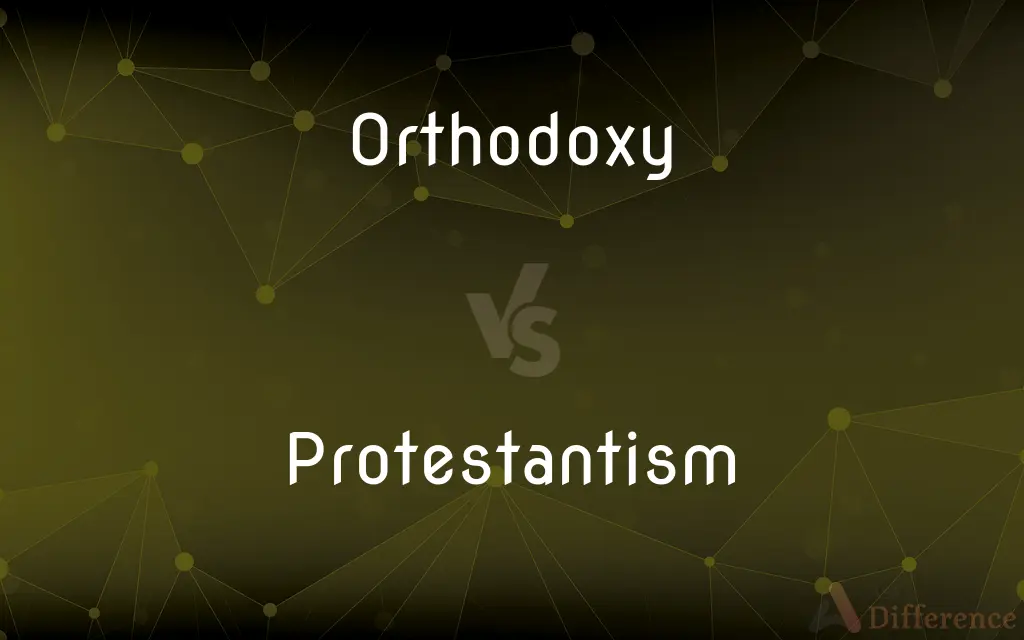Orthodoxy vs. Protestantism — What's the Difference?
By Tayyaba Rehman — Updated on September 26, 2023
Orthodoxy refers to the Eastern Christian tradition split from Roman Catholicism in 1054. Protestantism emerged in the 16th century as a reform movement within Western Christianity. Both are Christian denominations with distinct doctrines and practices.

Difference Between Orthodoxy and Protestantism
Table of Contents
ADVERTISEMENT
Key Differences
Orthodoxy represents the Christian practices and beliefs that evolved in the Eastern Roman (Byzantine) Empire, distinct from the Western Roman Empire. Following the Great Schism in 1054, the Eastern Orthodox Church distinguished itself from Roman Catholicism. Protestantism, meanwhile, emerged much later in the 16th century, initiated by figures like Martin Luther in Western Europe, seeking reforms within the Roman Catholic Church.
The theological underpinnings of Orthodoxy and Protestantism vary significantly. While both acknowledge the Trinity and the divinity of Jesus Christ, they differ on aspects like original sin, salvation, and sacraments. For instance, Orthodoxy places a strong emphasis on theosis (deification), a transformative process leading to union with God. In contrast, many Protestant denominations focus on salvation through faith alone (sola fide).
Liturgical practices and traditions also highlight the distinction between Orthodoxy and Protestantism. The Orthodox Church's rituals, from the Divine Liturgy to the use of icons in worship, have ancient roots. On the other hand, Protestantism, with its emphasis on a personal relationship with God, has a range of worship styles, from the high church liturgies of Anglicanism to the more informal services of Evangelical churches.
Church governance offers another point of differentiation. The Orthodox Church operates under a conciliar model with autocephalous (self-governing) churches and does not have a centralized authority akin to the Pope. Protestantism's governance varies by denomination; some have hierarchical structures, while others adopt congregational or presbyterian models.
In essence, while both Orthodoxy and Protestantism fall under the Christian umbrella, they have evolved from different historical, theological, and cultural contexts, leading to distinct practices, beliefs, and church structures.
ADVERTISEMENT
Comparison Chart
Origins
Eastern Roman Empire (Byzantine)
Reformation in Western Europe (16th century)
Theological Focus
Theosis (deification)
Salvation through faith alone
Liturgical Style
Ancient rituals, use of icons
Varies; from high church to informal services
Governance
Conciliar with autocephalous churches
Varies; hierarchical, congregational, presbyterian
Historical Context
Split from Roman Catholicism in 1054 (Great Schism)
Reform movement within Roman Catholicism
Compare with Definitions
Orthodoxy
The Christian traditions and practices of the Eastern Church.
The beauty of Orthodoxy is evident in its ancient liturgies and rich traditions.
Protestantism
Collective term for Christian denominations that are neither Catholic nor Orthodox.
The diversity within Protestantism spans from Baptists to Lutherans.
Orthodoxy
Adherence to accepted and traditional beliefs.
His views aligned with Orthodoxy, ensuring they met the conventional standards.
Protestantism
The faith, practices, and church order of the Protestant churches.
The growth of Protestantism in the 16th century reshaped European religious landscapes.
Orthodoxy
The doctrines and practices of the Eastern Orthodox Church.
Many tourists are fascinated by the rituals and aesthetics of Orthodoxy when they visit Eastern Europe.
Protestantism
Christian doctrines originating from the protests against Roman Catholic practices.
Justification by faith alone is a core tenet of Protestantism.
Orthodoxy
A branch of Christianity distinct from Catholicism and Protestantism.
While touring Greece, he attended a service to experience Orthodoxy firsthand.
Protestantism
A Christian movement that emerged during the Reformation in opposition to the Roman Catholic Church.
Martin Luther's Ninety-Five Theses played a pivotal role in the birth of Protestantism.
Orthodoxy
Orthodoxy (from Greek: ὀρθοδοξία, orthodoxía, 'righteous/correct opinion') is adherence to correct or accepted creeds, especially in religion.Orthodoxy within Christianity refers to acceptance of the doctrines defined by various creeds and ecumenical councils in Antiquity, but different Churches accept different creeds and councils. Such differences of opinion have developed for numerous reasons, including language and cultural barriers.
Protestantism
A branch of Christianity emphasizing personal faith and the Bible's authority.
Protestantism's emphasis on scripture led to widespread Bible translations.
Orthodoxy
The quality or state of being orthodox.
Protestantism
Protestantism is a form of Christianity that originated with the 16th-century Reformation, a movement against what its followers perceived to be errors in the Catholic Church. Protestants originating in the Reformation reject the Roman Catholic doctrine of papal supremacy, but disagree among themselves regarding the number of sacraments, the real presence of Christ in the Eucharist, and matters of ecclesiastical polity and apostolic succession.
Orthodoxy
Orthodox practice, custom, or belief.
Protestantism
Adherence to the religion and beliefs of a Protestant church.
Orthodoxy
The beliefs and practices of the Eastern Orthodox Church.
Protestantism
The religion and religious beliefs fostered by the Protestant movement.
Orthodoxy
Orthodox Judaism.
Protestantism
Protestants considered as a group.
Orthodoxy
Correctness in doctrine and belief.
Protestantism
The quality or state of being protestant, especially against the Roman Catholic Church; the principles or religion of the Protestants.
Orthodoxy
Conformity to established and accepted beliefs (usually of religions).
Protestantism
The theological system of any of the churches of western Christendom that separated from the Roman Catholic Church during the Reformation
Orthodoxy
Soundness of faith; a belief in the doctrines taught in the Scriptures, or in some established standard of faith; - opposed to heterodoxy or to heresy.
Basil himself bears full and clear testimony to Gregory's orthodoxy.
Orthodoxy
Consonance to genuine Scriptural doctrines; - said of moral doctrines and beliefs; as, the orthodoxy of a creed.
Orthodoxy
By extension, said of any generally accepted doctrine or belief; the orthodox practice or belief.
Orthodoxy
The quality of being orthodox (especially in religion)
Orthodoxy
A belief or orientation agreeing with conventional standards
Orthodoxy
The state of conforming to established doctrine, especially in religion.
Her beliefs were in line with Orthodoxy, leaving no room for unconventional ideas.
Common Curiosities
Is the Pope a figure in Orthodoxy?
No, Orthodoxy does not have a centralized figure like the Pope.
When did Orthodoxy formally split from the Roman Catholic Church?
In 1054, during the Great Schism.
What event sparked the start of Protestantism?
The Reformation in the 16th century, notably Martin Luther's Ninety-Five Theses.
Which Bible do most Protestant denominations use?
Many use the King James Version or other translations emphasizing sola scriptura.
What is "theosis" in Orthodoxy?
It's a transformative process aiming for union with God or deification.
Can one see the influence of Orthodoxy in particular regions?
Yes, especially in Eastern Europe, Greece, and Russia.
Is sola scriptura a tenet of Protestantism?
Yes, it emphasizes the Bible's authority in matters of faith and practice.
Were the origins of Protestantism solely theological?
While theology played a major role, political and social factors also influenced Protestantism's rise.
How does Orthodoxy view the Holy Trinity?
Orthodoxy believes in the Trinity as three distinct persons in one essence.
How do Orthodox Christians view the Virgin Mary?
She's highly venerated as Theotokos, the "God-bearer."
What are some main Protestant denominations?
Baptist, Methodist, Lutheran, Anglican, and Presbyterian, among others.
What's a significant difference between Protestant and Catholic Bibles?
Protestant Bibles usually don't include the Deuterocanonical books.
How do Orthodox churches govern themselves?
They operate under a conciliar model with autocephalous (self-governing) churches.
Do all Protestant denominations have the same beliefs?
No, Protestantism encompasses a wide range of beliefs and practices across denominations.
Share Your Discovery

Previous Comparison
Canteen vs. Mess
Next Comparison
Practical vs. TacticalAuthor Spotlight
Written by
Tayyaba RehmanTayyaba Rehman is a distinguished writer, currently serving as a primary contributor to askdifference.com. As a researcher in semantics and etymology, Tayyaba's passion for the complexity of languages and their distinctions has found a perfect home on the platform. Tayyaba delves into the intricacies of language, distinguishing between commonly confused words and phrases, thereby providing clarity for readers worldwide.
















































